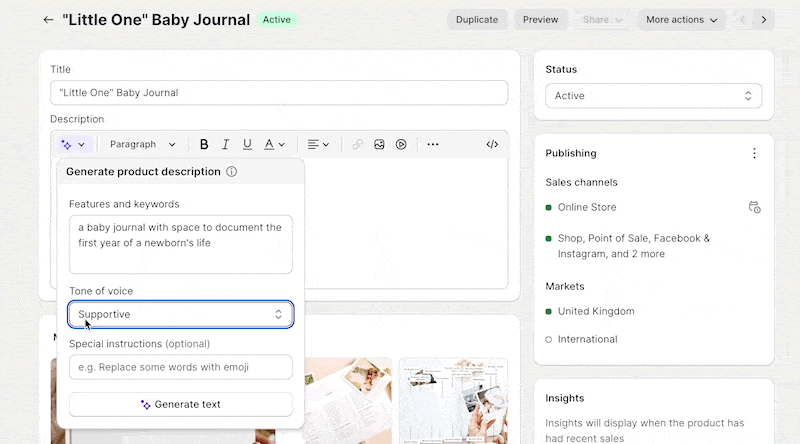Artificial intelligence (AI) in ecommerce is not the future of ecommerce anymore—it is here and now. From being just a “nice-to-have” tool, AI in ecommerce is proving to be a must-have system to ensure ecommerce success.
AI for ecommerce uses a lot of technologies to deliver personalized recommendations, smart searches, better (and automated) customer service, dynamic pricing options, fraud detection and prevention, and marketing through generative AI.
In this guide, we show you several use cases of AI in ecommerce, along with examples, and present benefits and risks online merchants need to be aware of.
Types of Artificial Intelligence in Ecommerce
Before diving into how AI can help your business, it helps to know the different types of AI. What you need to know is that AI isn’t restricted to just one technology—it uses different models.
The four leading AI technologies used in ecommerce are:
- Natural language processing (NLP) focuses on allowing and empowering computers to interpret and generate natural human language.
- Data mining gathers both current and historical data to inform AI algorithms and systems.
- Computer vision (CV) lets computers interpret data from images and videos.
- Machine learning (ML) uses a collection of algorithms and statistical techniques to help computers “learn” from data so they can apply past experience or provide examples to solve a problem. This AI type uses deep learning models—layering several algorithms to gain greater understanding of data.
AI Use Cases in Ecommerce (With Examples)
Although you probably have been using AI for your ecommerce business already, you just might not know that the technology most of these applications are built on is actually related to AI. Below are some use cases and examples of how AI is used in ecommerce.
Personalization
Personalization is a huge ecommerce trend that’s not going away anytime soon. Shoppers crave personalized shopping experiences; they are even more likely to be repeat customers when presented with a personalized brand shopping experience.
AI can quickly analyze data and fetch trends from past customer behavior—from browsing history to purchase history—and customize the shopping experience according to the customer’s preferences and tastes.
For example, NLP-based technology can understand an online shopper’s language and images to quickly match them with desired products. AI can help with product recommendations, run an automated personalized email campaign, and show recently viewed products.
With personalization, ecommerce stores using AI can leverage customers’ inclinations for impulse buying and have more effective cross-sell and upsell recommendations.
In Action: Online personal styling service Stitch Fix uses AI to analyze customer data and preferences to create personalized style recommendations. It combines the power of AI and human stylists to deliver clothing and accessories catered to customers’ individual tastes and needs.
Customer Service
Chatbots are transforming the customer experience. Chatbots have upgraded because of AI—with the help of NLP and generative AI—to understand and respond to customer requests.
Chatbots can provide 24/7 customer service, collect customer data by assisting with inquiries, make efficient customer interactions, and enhance the checkout experience.
In Action: Sephora has the Sephora Reservation Assistant chatbot and Sephora Color Match for Sephora Virtual Artist chatbot to directly reply to consumers’ questions or inquiries. Sephora reported an 11% increase in sales because of these chatbots.
An example of how Sephora’s chatbot, Sephora Reservation Assistant, works in Messenger.
See also:
- Artificial Intelligence in Customer Service: The Ultimate Guide
- Best AI Chatbots for Customer Service
Voice Search & Commerce
Voice commerce is an emerging ecommerce trend, owing to the fact that more people own smart speakers nowadays. Voice search is especially useful if enabled in your online store.
If you are already using a voice assistant such as Apple’s Siri or Amazon’s Alexa, voice searches for ecommerce work the same way. Voice search leverages AI voice recognition using computing and linguistics to allow shoppers to search for things without typing. AI identifies the words and phrases, as well as the phonemes that help distinguish one word from another a person typically uses.
As an online merchant, what you need to remember about voice searches is that they work a bit differently from ecommerce SEO. When assigning keywords to your products, use conversational keywords or words that people actually use when talking.
In Action: Use voice searches for product discovery (remember Nike’s “Ask Nike” campaign), cart management (Walmart’s Voice Order), self-checkout (Amazon’s Echo can store a user’s preferred payment method and do the checkout for the shopper), delivery tracking, and post-purchasing services.
Take, for example, Oasis Clothing, a fashion clothing brand. Shoppers can use its Oasis app to send a voice complaint about purchases. Its system would then connect the shopper to customer service or arrange for a return or exchange.
Dynamic Pricing
AI can help you have more flexibility in pricing structuring. Called dynamic pricing, you can adjust pricing and offerings based on real-time user behavior, consumer demand, and competitor pricing.
Because of this, you can vary prices across different sales channels depending on observed demand. You can anticipate sale offerings and determine the minimum discount you need to offer to get a successful conversion. Additionally, leverage AI to price-match your competitors to stay competitive.
In Action: Amazon is a great example of an online store that fully leverages AI for dynamic pricing. It regularly adjusts pricing on its products by up to 20% when competitors offer promotions or discounts. However, it does this gradually to ensure maximum profitability based on sales forecasts and AI. In fact, its prices manage to remain the cheapest and yet it maintains control over its profit margins.
Supply Chain Optimization (Sales Forecast & Smart Logistics)
AI can help optimize your supply chain logistics by predicting demand, reducing inventory costs, and improving delivery times. AI analyzes consumer behavior and purchasing patterns and generates forecast demand more accurately. In turn, you can optimize inventory levels.
Moreover, AI can enhance logistics and transportation routes that can reduce delivery times and costs. Smart logistics uses real-time information from sensors and RFID tags from inventory management systems to forecast demand. Because of this, machine learning systems become smarter over time, so they can better predict supply chain and logistics for your business.
In Action: French food manufacturer Danone Group leverages machine learning to improve its accuracy of demand forecasting. It shares that it has resulted in a 20% reduction in false forecasts, a 30% reduction in lost sales, and a 50% reduction in the workload of customer demand planners.
Fraud Detection & Prevention
AI can also be used to detect and prevent fraud for your ecommerce business. AI analyzes patterns in customer behavior through purchases and can detect and flag suspicious activity. This in turn reduces the risk of fraudulent transactions and chargebacks.
For example, a shopper might place multiple orders in a short span of time or use an unrecognized address. AI can detect these and flag these transactions as potential fraud attempts.
In Action: Big retailers Unilever and Home Depot use AI to deploy analytics services for fraud detection in their store branches.
Content Creation & Marketing (Generative AI)
Generative AI is a system that can generate text, images, or other media based on prompts. Think ChatGPT and DALL-E. You can use these generative AI tools to ramp up production for content marketing and even personalize it for your targeted buyers. You can even use it to write product descriptions for your product listings.
An example of how you can generate product descriptions in Shopify using generative AI (Source: Shogun)
See also:
- What AI Content Marketing Is & How to Use AI in Content Creation
- Best AI Content Writers for Small Business Marketing
- Ways to Use AI for Small Business Marketing
- Ways to Use AI in Social Media (+ Examples)
Benefits of AI in Ecommerce
Based on the use cases above, you can probably discern how AI can impact ecommerce. AI offers plenty of benefits, to name a few:
- Saving and reallocation of time and resources: AI primarily helps automate a lot of manual processes across all ecommerce operations—from logistics, payments, product management, and marketing to customer service. You reduce operational costs and improve operations efficiency at the same with automation, so you spend less time on store maintenance and focus more on product research and innovation. Small business owners can definitely leverage AI to streamline one-man operations.
- Increased sales: With personalized shopping experiences, better product recommendations, smart searches, and more marketing help through AI tools at your disposal, AI can help increase sales for your ecommerce store. Data analytics and reporting also greatly help you make better business decisions.
- Personalized customer service: Using AI, ecommerce stores can use data from customer feedback across multiple touchpoints and measure customer interactions. They can further use this information to improve their customer service.
Challenges of AI in Ecommerce
While AI definitely gives plenty of benefits and opportunities for ecommerce, it also poses several risks and challenges that small businesses need to be aware of so they can address them head-on. Some of these challenges include:
- Data privacy: AI is hugely dependent on vast amounts of consumer data so they can provide personalized recommendations and make accurate predictions. Data collection at this level raises privacy and data protection concerns. Transparency should be a priority and ecommerce businesses should ensure they publicly disclose how they collect and use customer data and how they comply with relevant data protection regulations.
- Loss of customer trust: If data privacy concerns are not resolved, this can also impact customer trust in using ecommerce in general. For example, consumers will end up being hesitant to make purchases because it means sharing their data and they do not trust the AI algorithms being used. Again, transparency is key here.
- Job displacement: As AI further automates manual processes, job displacement for humans becomes a problem. However, if we take a look at this challenge from a different perspective, AI can also create new job opportunities such as data analytics and AI development.
Bottom Line
While there are some doubts and pullbacks from other sectors, there is no denying that AI in ecommerce—and in all industries—is here to stay. AI in ecommerce just poses so much more benefits than risks. Automation, personalization, smart logistics, and better service are just the tip of what AI can do for ecommerce. However, small businesses should not close their eyes to the potential risks and challenges, such as data privacy concerns. Addressing these challenges head-on will help ecommerce companies accelerate their AI use and reap its benefits.

